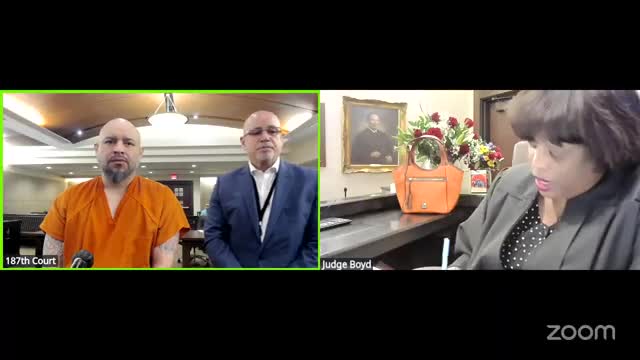Court Sentences Medine to Seven Years Deferred Adjudication and Community Service
May 16, 2025 | Judge Stephanie Boyd 187th District, District Court Judges, Judicial, Texas
This article was created by AI summarizing key points discussed. AI makes mistakes, so for full details and context, please refer to the video of the full meeting. Please report any errors so we can fix them. Report an error »

In a recent session of the 187th District Court, Judge Stephanie Boyd addressed a case involving a defendant who has accepted responsibility for his actions and is set to undergo a structured rehabilitation process. The court's decision reflects a commitment to balancing accountability with opportunities for rehabilitation, a crucial aspect of the justice system.
The defendant, represented by his attorney, expressed remorse and confirmed that restitution has been settled through his insurance. The court approved a plea bargain that includes seven years of deferred adjudication, allowing the defendant to avoid a lengthy prison sentence while still facing consequences for his actions. This arrangement includes a $2,000 fine, which will be probated, and the defendant will be required to complete 200 hours of community service.
As part of his rehabilitation, the defendant will be monitored closely, with regular reporting requirements and random drug tests. He is also prohibited from working in home health care or with minors, ensuring the safety of vulnerable populations. The court emphasized the importance of employment, mandating that he secure a job within 30 days of his release.
Judge Boyd highlighted the court's hope for the defendant's success during probation, encouraging him to seek assistance if needed. This approach underscores the court's focus on rehabilitation and support, aiming to help individuals reintegrate into society successfully.
Overall, this case illustrates the court's efforts to provide a fair and constructive resolution, balancing the need for accountability with the potential for personal growth and community reintegration. The decision reflects broader goals of the justice system to foster rehabilitation and reduce recidivism, ultimately benefiting the community as a whole.
The defendant, represented by his attorney, expressed remorse and confirmed that restitution has been settled through his insurance. The court approved a plea bargain that includes seven years of deferred adjudication, allowing the defendant to avoid a lengthy prison sentence while still facing consequences for his actions. This arrangement includes a $2,000 fine, which will be probated, and the defendant will be required to complete 200 hours of community service.
As part of his rehabilitation, the defendant will be monitored closely, with regular reporting requirements and random drug tests. He is also prohibited from working in home health care or with minors, ensuring the safety of vulnerable populations. The court emphasized the importance of employment, mandating that he secure a job within 30 days of his release.
Judge Boyd highlighted the court's hope for the defendant's success during probation, encouraging him to seek assistance if needed. This approach underscores the court's focus on rehabilitation and support, aiming to help individuals reintegrate into society successfully.
Overall, this case illustrates the court's efforts to provide a fair and constructive resolution, balancing the need for accountability with the potential for personal growth and community reintegration. The decision reflects broader goals of the justice system to foster rehabilitation and reduce recidivism, ultimately benefiting the community as a whole.
View full meeting
This article is based on a recent meeting—watch the full video and explore the complete transcript for deeper insights into the discussion.
View full meeting
